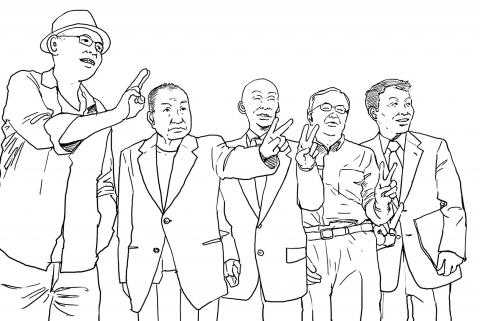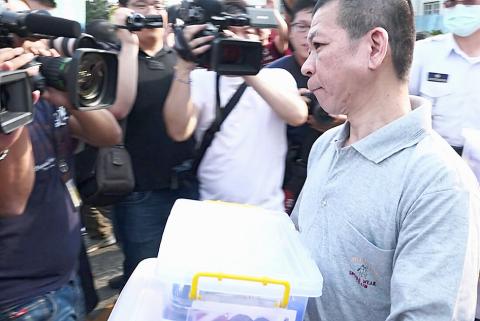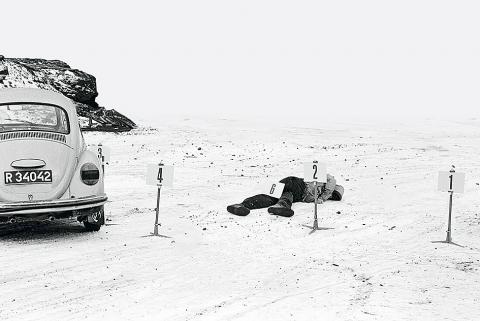In 2002, Cheng Hsing-tse (鄭性澤) was convicted of killing a policeman in a gunfight at a karaoke bar. He was sentenced to death by the Supreme Court in 2006. But a decade later, Cheng walked out a free man after the Taiwan High Court overturned his conviction.
Cheng is one of eight defendants who have been exonerated through the work of the Taiwan Innocence Project (台灣冤獄平反協會, TIP). Inspired by the Innocence Project in the US, the non-government organization was established in 2012 and provides legal assistance to defendants in cases where they have been wrongfully convicted.
Cheng’s story, as well as the plight of other wrongfully convicted individuals and the impact on their loved ones and society are the focus of the first Innocence Film Festival organized by the TIP, which opens tomorrow. Admission is free for all screenings, which will take place at the Spot Huashan Cinema.

Photo courtesy of Taiwan Innocence Project
The theme of “What If” goes back to the pivotal moment when the lives of these defendants changed forever, and invites audiences to consider what the world would be like if the truth is not always as it appears to be.
In Cheng’s case, the TIP identified issues of unlawful interrogation, forced confession and misapplication of forensic science analysis in the original trial. A key detail was the flawed gunshot trajectory analysis used in his trial. After re-examining the evidence, the prosecution filed for retrial, and Cheng was eventually cleared of his crime.
“The judiciary must deeply engrave this in its the soul: how humble people become when they are before you. The way that autumn frost disappears without a sound, that’s also how people are before the judiciary,” writer and activist Chang Chuan-fen (張娟芬) said of the incident, as a reminder of the sacred power of the judiciary. Chang was one of the earliest individuals to start working on Cheng’s case.

Photo courtesy of Taiwan Innocence Project
Documentary Cheng Hsing-tse’s 48 Hours (鄭性澤的48小時) will screen as part of a Taiwan short film selection at 2:30pm on Saturday. Other cases explored in the selection are that of Chen Yen-fei (陳燕飛) in On the Flyway Home (飛燕歸巢), Su Bing-kun (蘇炳坤) in Where Can the Dust Alight (何處惹塵埃) and Lu Chin-kai (呂金鎧), who is still serving out a 20-year prison sentence for rape and murder, in The Sound of Silence (無聲時刻).
Other films look at how wrongful convictions have unfolded around the world. The Central Park Five is an award-winning documentary by US filmmakers Ken Burns, David McMahon and Sarah Burns that follows the fates of four African American and two Hispanic American teenagers convicted for the rape and assault of a white female jogger.
The case became a lightning rod for discussions of racial discrimination in the justice system, and received renewed attention when it became the subject of a Netflix drama series earlier this year.

Photo courtesy of Taiwan Innocence Project
Out of Thin Air looks at the 1974 Guomundur and Geirfinnur case in Iceland, when two manual laborers disappeared under mysterious circumstances. Despite a lack of any bodies, six people were convicted for the murders. Five were acquitted last year.
From Japan, the documentary Gokutomo, or “prison friends,” follows the unlikely friendship that formed between five men, all convicted of murder, who found solace and support in each other throughout their years in prison, despite maintaining their innocence. Promise: The Nabari Poisoned Wine Case, the Life of a Death-row Inmate looks at a death-row prisoner who was still fighting a 1961 conviction for murder when he died in prison in 2015.
While an interest in true crime may be enough to draw audiences in, the films will also invite deeper reflection on how the legal system and society at large carry out justice, and how grace is maintained in the face of injustice.

We lay transfixed under our blankets as the silhouettes of manta rays temporarily eclipsed the moon above us, and flickers of shadow at our feet revealed smaller fish darting in and out of the shelter of the sunken ship. Unwilling to close our eyes against this magnificent spectacle, we continued to watch, oohing and aahing, until the darkness and the exhaustion of the day’s events finally caught up with us and we fell into a deep slumber. Falling asleep under 1.5 million gallons of seawater in relative comfort was undoubtedly the highlight of the weekend, but the rest of the tour

Youngdoung Tenzin is living history of modern Tibet. The Chinese government on Dec. 22 last year sanctioned him along with 19 other Canadians who were associated with the Canada Tibet Committee and the Uighur Rights Advocacy Project. A former political chair of the Canadian Tibetan Association of Ontario and community outreach manager for the Canada Tibet Committee, he is now a lecturer and researcher in Environmental Chemistry at the University of Toronto. “I was born into a nomadic Tibetan family in Tibet,” he says. “I came to India in 1999, when I was 11. I even met [His Holiness] the 14th the Dalai

Following the rollercoaster ride of 2025, next year is already shaping up to be dramatic. The ongoing constitutional crises and the nine-in-one local elections are already dominating the landscape. The constitutional crises are the ones to lose sleep over. Though much business is still being conducted, crucial items such as next year’s budget, civil servant pensions and the proposed eight-year NT$1.25 trillion (approx US$40 billion) special defense budget are still being contested. There are, however, two glimmers of hope. One is that the legally contested move by five of the eight grand justices on the Constitutional Court’s ad hoc move

Stepping off the busy through-road at Yongan Market Station, lights flashing, horns honking, I turn down a small side street and into the warm embrace of my favorite hole-in-the-wall gem, the Hoi An Banh Mi shop (越南會安麵包), red flags and yellow lanterns waving outside. “Little sister, we were wondering where you’ve been, we haven’t seen you in ages!” the owners call out with a smile. It’s been seven days. The restaurant is run by Huang Jin-chuan (黃錦泉), who is married to a local, and her little sister Eva, who helps out on weekends, having also moved to New Taipei